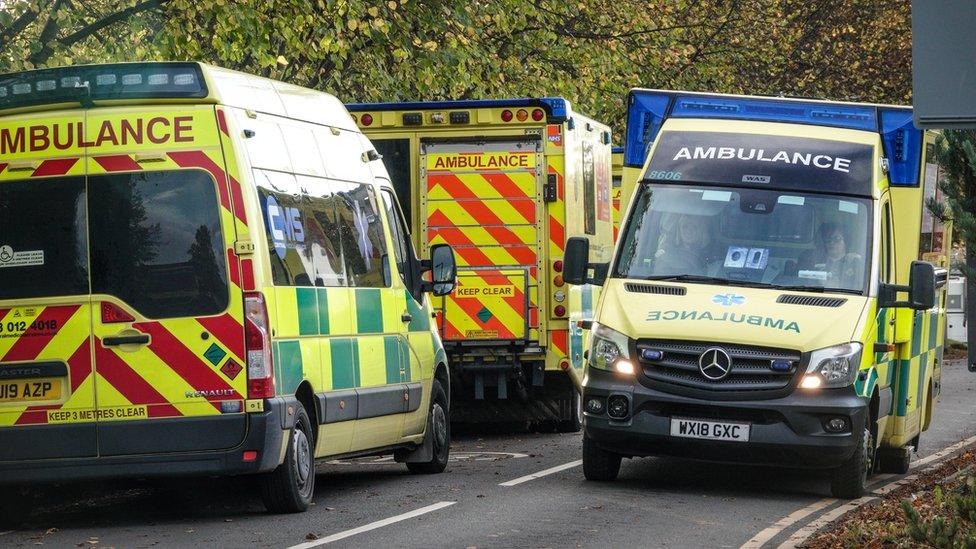Ambulance strike: Yorkshire staff have 'had enough'
- Published
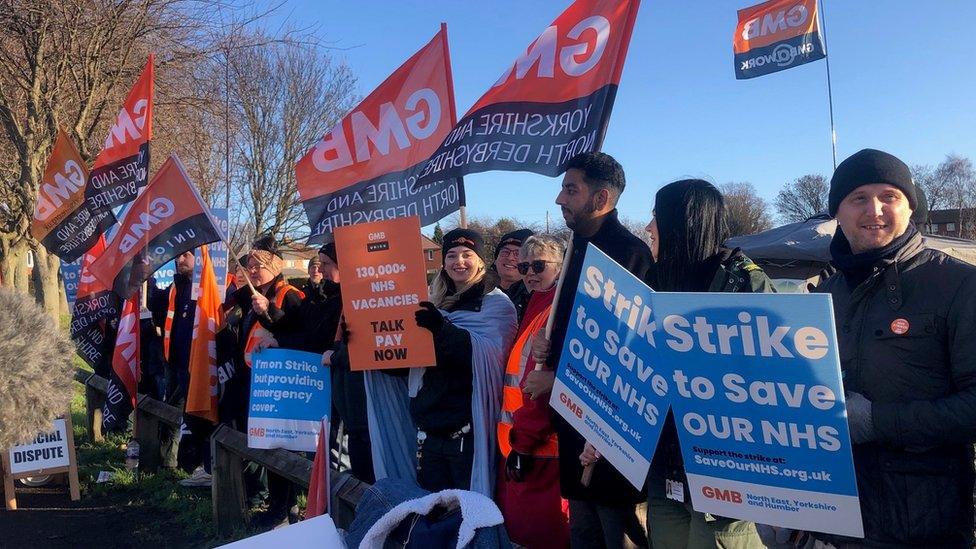
Yorkshire Ambulance Service staff in Wakefield joined the national strike
Striking ambulance workers in Yorkshire say they have "had enough", with staff reporting being stuck in their vehicles for "hours on end" due to demand.
Yorkshire Ambulance Service (YAS) workers are among staff taking part in industrial action across England and Wales in a pay dispute.
The walkout only affects non life-threatening calls, unions said.
One paramedic in Sheffield said: "It has become stressful for a long time, but this is the pinnacle of it."
In the Yorkshire and the Humber region, action by GMB union members started at 00:01 on Wednesday and is due to end at 00:01 on Thursday.
Unison members would take action for 12 hours from noon on Wednesday, YAS said.
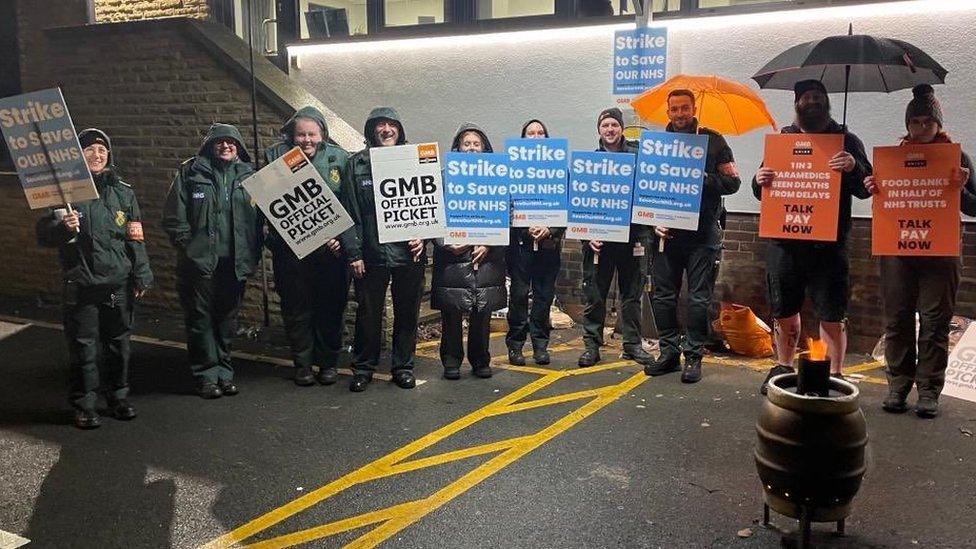
Ambulance crews in Bradford stood in support of the strike in the early hours of Wednesday
In Wakefield in West Yorkshire, paramedic Abigail Rowley, who has been in the job for 18 months, said she believed strike action was her only choice.
"I think it's important that we are all together and supporting the NHS, we need to come together as one because it's underfunded and we're not going to patients," she said.
"We're stuck in the back of ambulances for hours on end and we just need to sort something out."
Moments after the BBC spoke to Ms Rowley, she climbed into an ambulance to respond to a Category 1 life-threatening call.
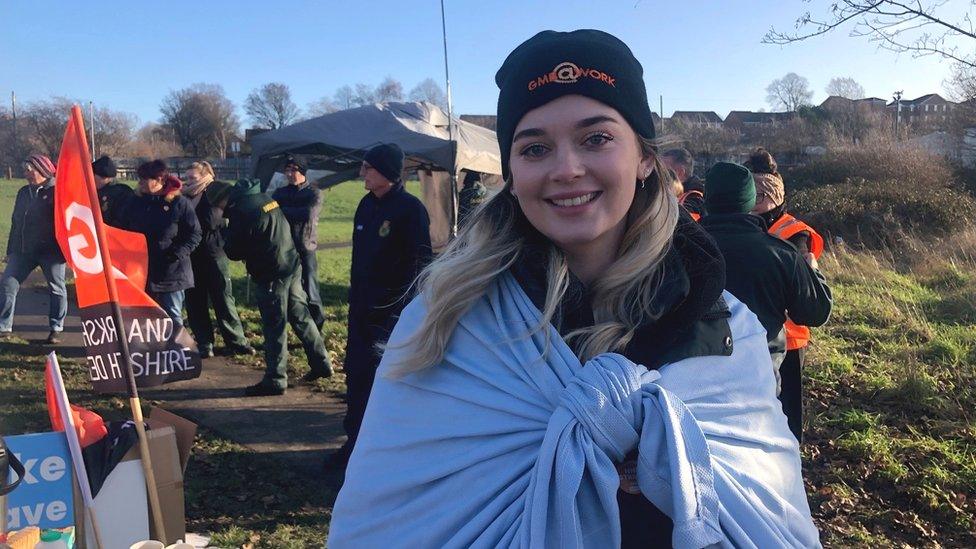
On a picket line in Wakefield, Abigail Rowley said paramedics were finding themselves "stuck in the back of ambulances for hours on end"
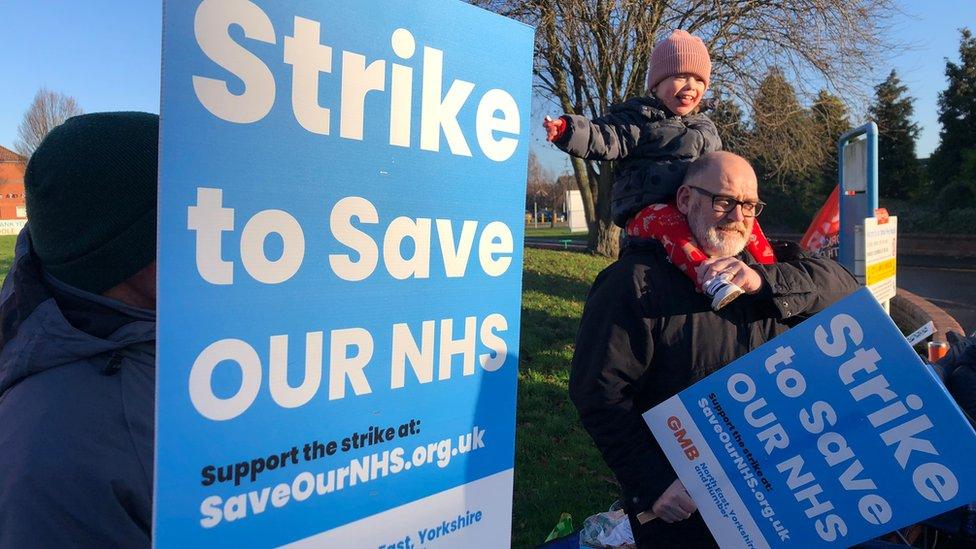
Ambulance staff held placards outside Goole and District Hospital in East Yorkshire on Wednesday morning
Speaking to BBC Radio York, Bryn Webster, chair of Unison's National Ambulance Committee, said his members had been "backed into a corner and we can't retain staff".
"Ambulance crews are really finding it difficult, we have to remember that patients are waiting for hours and hours on a normal day and we have to highlight this," he said.
"We are wanting an above-inflation pay rise, but more importantly, we're after some proper funding and a look at how the ambulance service and NHS is funded."
A spokesperson for YAS said during the action, which is part of a national pay dispute with the government, members of the public should only dial 999 for "an ambulance for life-threatening conditions or injuries."
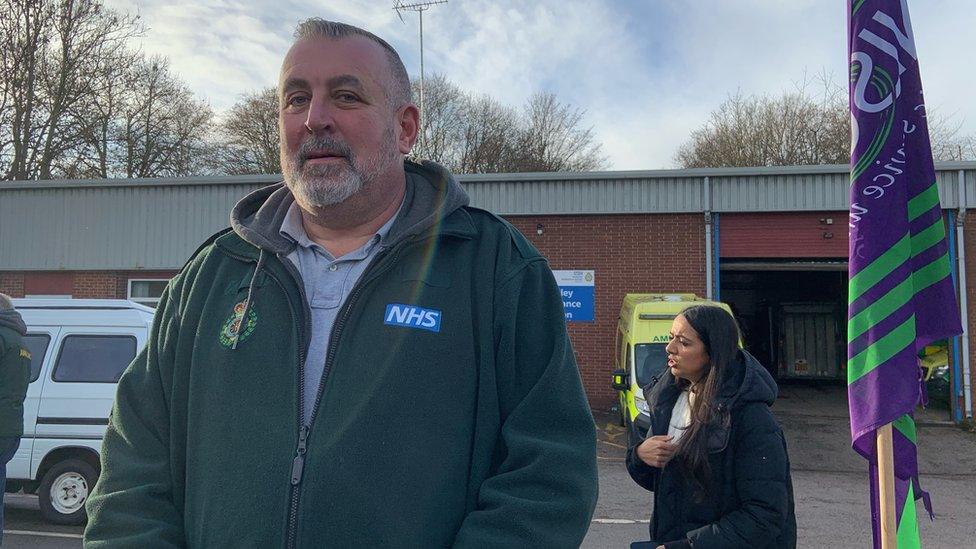
Bryn Webster, chair of Unison's National Ambulance Committee, said "I don't want anyone to think that we are doing this lightly"
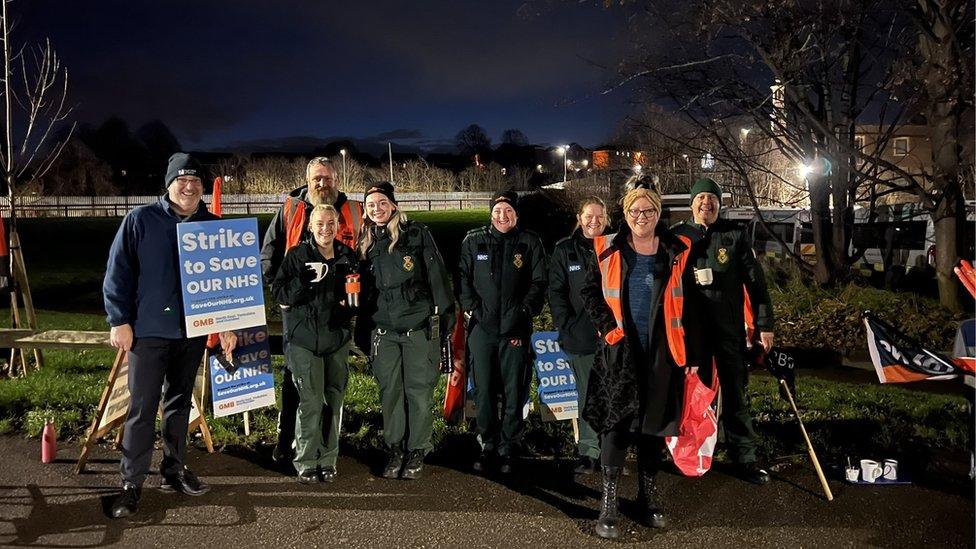
Many GMB union members at Yorkshire Ambulance Service formed picket lines at 00:01 on Wednesday
Nick Smith, YAS director of operations said: "All calls will be answered, but we'll prioritise calls and ensure we send to life-threatening or very serious cases.
"So unfortunately some patients in the lower categories of less acute incidents may get a delayed response."
Mr Smith said he would advise patients with less acute issues to "make their own way to emergency departments, or call their GP, NHS online or pharmacies."
"We will still respond, we just may take longer getting there than we'd like to", he added.


Analysis by Jamie Coulson, BBC Yorkshire health correspondent
There are around 20 ambulance workers on the picket line in Wakefield, some in full uniform in case they are called away to deal with a life-threatening emergency.
Here they are predominantly GMB members on a 24-hour walkout, but at other stations UNISON members are also on strike for 12 hours.
Like nurses on Tuesday, these ambulance staff are angry at a below-inflation pay offer.
The government says it's fair and based on independent advice, but those here disagree sufficiently to walk off the job.
YAS declared a critical incident on Tuesday, with more major disruption expected during the strike.
There is a mixture of anger and frustration among those I've spoken to, with many saying the strike is a last resort but also their only option.

At Longley Ambulance station in Sheffield, paramedic Simon Boulby said: "It has become stressful for a long time, but this is the pinnacle of it, we've had enough."
"It's the workload regarding the number of patients calling 999, our resources simply cannot cover that demand and the more we try it, the more we're putting people at risk."
He added: "I don't want to do this, I want to be looking after people who need us but we simply cannot safely go out and do the job we should be doing - it's simply not safe and there's a lot of people affected by it."
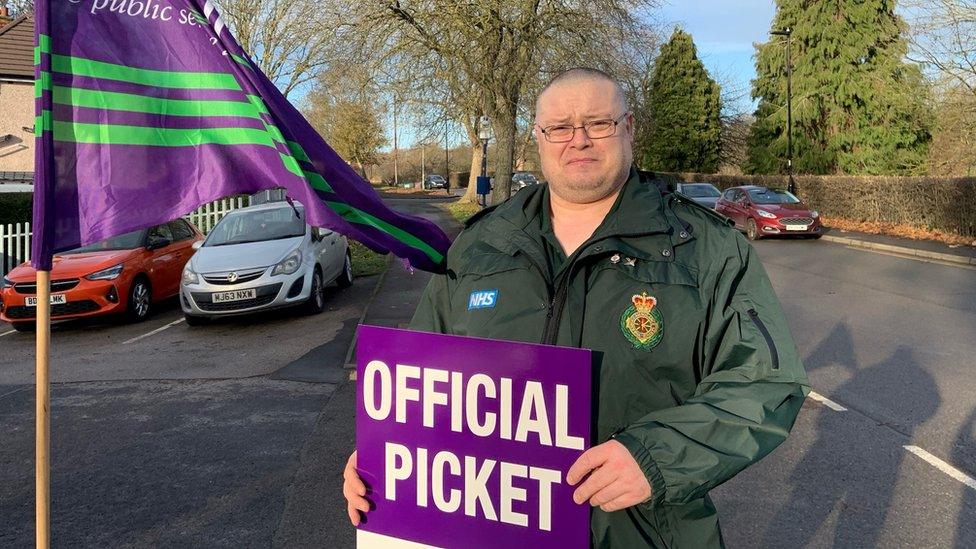
In Sheffield, paramedic Simon Boulby said they weren't currently equipped to meet the demand they are facing on a daily basis
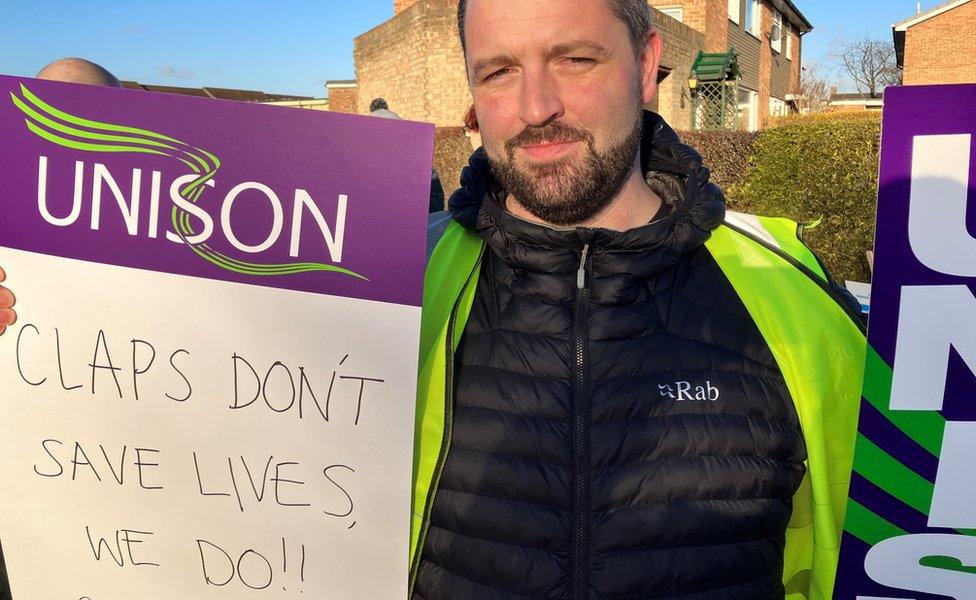
Referencing the national 'Clap for Our Carers' gesture during the Covid pandemic, paramedic Scott Rutter's placard read: "Claps don't save live, we do!!"
In Northallerton, North Yorkshire, paramedic Scott Rutter, 34, said delays at hospitals meant they were unable to help as many people as they wished to.
"There's nowhere to put these patients. The nurses are short-staffed, so people are having seizures in corridors, people are having to use bedpans because they can't get to the toilet. It's absolutely ridiculous," he said.
"We might only do one or two jobs per shift because we're just stuck in the hospital."
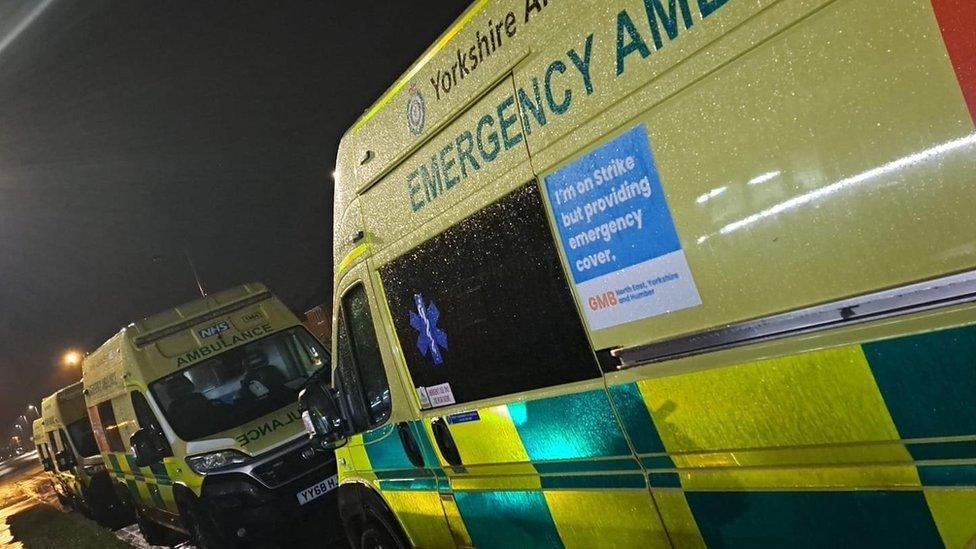
During strike action on Wednesday members of the public should only dial 999 for an ambulance for life-threatening conditions, YAS said
A statement issued by YAS said union membership of both GMB and Unison was approximately 4,000 staff out of a workforce of over 7,000.
Mr Webster, from Unison, added: "Our call takers in our York and Wakefield Emergency Operations Centres are one of the most vital roles within our trust, they get take-home pay of about £1,400 a month and we can't retain them.
"Nearly half of them leave in their first year after training, so I don't want anyone to think that we are doing this lightly.
"Our members are responding to life critical calls, so I hope that's some solace to the public in Yorkshire."
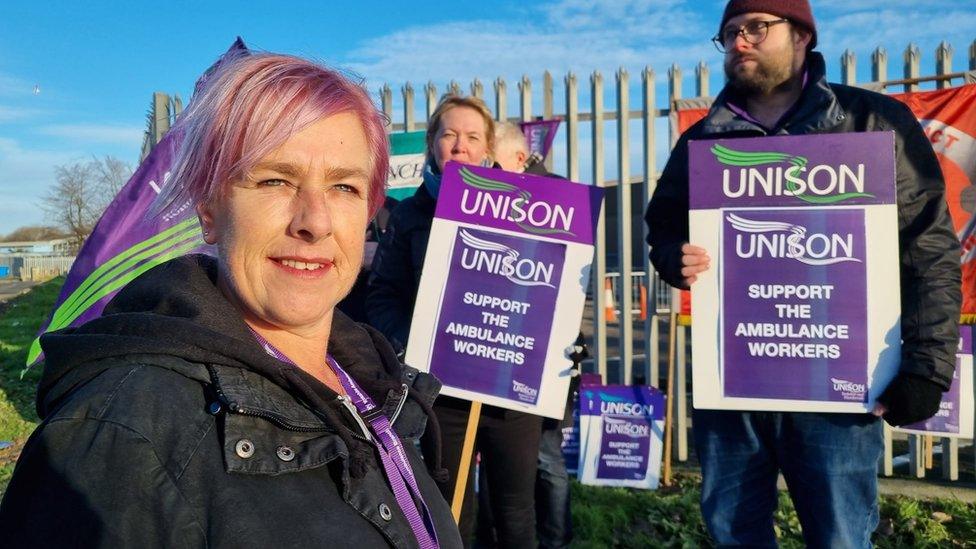
Wendy Smith, emergency care assistant and Unison rep for Hull Sutton Fields ambulance station, said some staff were restoring to using food banks
In East Yorkshire, Hull-based emergency care assistant Wendy Smith said: "We've got long queues, hospital delays for getting beds, long working hours. Sometimes we can't get to the patients that we really need to get to and that's heartbreaking.
"We have staff having to use food banks. They're that tired they can't mentally and physically do overtime."
She asked for "better pay, better conditions and better care for patients".
Ms Smith, who is the Unison rep for Sutton Fields ambulance station, added: "We can be queuing outside hospitals for eight or nine hours. When people are poorly, the last place you want to be is stuck in the back of the ambulance."
On Tuesday, YAS declared a critical incident as soaring demand saw people face "significant delays" waiting for ambulances.
Your device may not support this visualisation

Follow BBC Yorkshire on Facebook, external, Twitter, external and Instagram, external. Send your story ideas to yorkslincs.news@bbc.co.uk, external.
Related topics
- Published21 December 2022
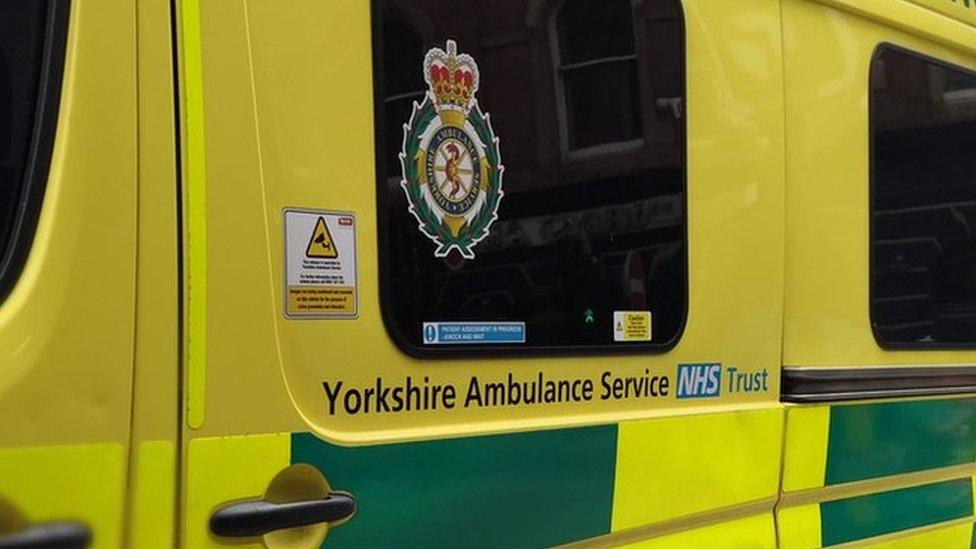
- Published10 January 2023
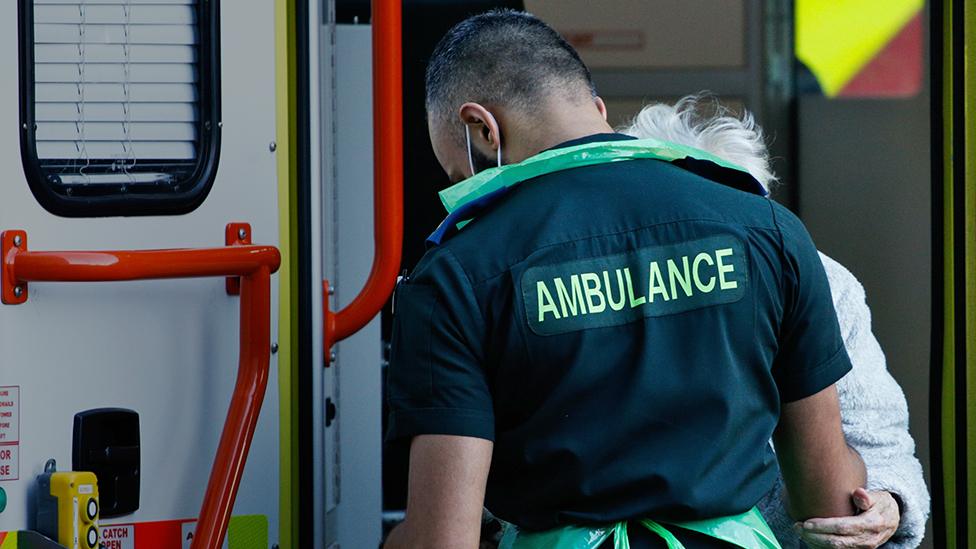
- Published17 December 2022
